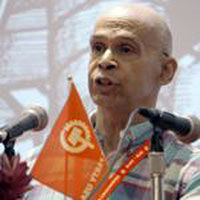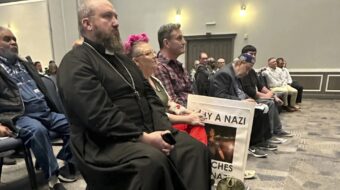A debate raged recently over growing Black unemployment – 30 percent among youth – as President Obama renewed federal support for historically Black colleges. At a White House ceremony on Friday, Obama noted that “it’s because of these schools that one out of every two wide-eyed freshmen who arrives on their campuses with big backpacks and bigger dreams is the first in his or her family to go to college.”
It is these working-class families of color who are bearing the brunt of the recession.
At stake in the debate is whether race-neutral federal anti-recessionary efforts are adequate. Many feel targeted measures are necessary. The issue flared red hot in the aftermath of a meeting last month between the civil rights leadership and President Obama on the subject of African American unemployment.
After the February dialog, the first in which the president has met with civil rights leaders, Tavis Smiley, a well-known Black journalist, criticized Obama for not having and promoting a Black agenda. Smiley has long been critical of the president and his policies.
The Rev. Al Sharpton, a participant in the White House discussion, responded that Obama is president of the entire country, not only of African Americans. Sharpton, along with other meeting participants including Benjamin Jealous of the NAACP and the Urban League’s Mark Morial, stressed that the talk with the president focused on employment efforts that would help all Americans, including Black people.
“In these times, it didn’t make sense to talk about race-based initiatives,” Mr. Jealous said in an interview after the meeting,” the New York Times reported. He continued, “It made more sense to target poor areas.” He added, “When you’re on the ground, the poor black community is the same as the poor white community.”
Sharpton, in his weekly radio show, noted that the president should not be faulted for raising issues the civil rights community itself should champion. Sharpton maintained that the president should be asked to respond to an agenda put forward by African Americans.
At stake here are the tactics of engagement with a friendly administration in circumstances in which extreme pressure is being brought to bear from many sides.
In addition another issue looms: Is the administration’s contention that a rising tide lifts all boats valid? Or is it the case that some are some stuck on the bottom and in need of special measures to be lifted from the mud?
The Congressional Black Caucus seems to hold the latter view, but its members are quick to point out that they are not at odds with the president, but rather that each must play different roles. CBC leaders in December argued forcefully for programs targeted to assist those hardest hit by the recession.
After failing to have their concerns met by administration officials the Black legislators boycotted committee votes on financial regulatory reform. In December, Rep. Barney Frank, chair of the House committee, agreed to the CBC’s demands: “Frank agreed to Waters’s proposal to steer $3 billion from the federal Troubled Assets Relief Program toward mortgage relief for the unemployed. The bill also sets aside $1 billion for a program that gives grants to state and local governments to buy foreclosed properties and use them for more productive purposes.”
Unfortunately, the battle did not end there. When the final bill was passed these provisions may been left out. Columunist Clarence Page writes, “When the House passed its $154 billion jobs bill in December, it left out the caucus’ request to direct 10 percent of the funding to low-income communities.”
Page may be reporting only part of the story. The LA Times writes: “The House in December passed a $154-billion jobs bill that included several provisions sought by the Congressional Black Caucus, such as a $500-million summer jobs program and a $1-billion fund for affordable housing. It also included $26.7 billion to help state and local governments maintain public service jobs – workforces in which minorities are well represented.”
Insisting on the need for special measures the CBC is keeping up the pressure. The LA Times continues: “Rep. Barbara Lee (D-Oakland), the black caucus chairwoman, met with Senate Majority Leader Harry Reid (D-Nev.) recently to urge inclusion of those priorities in the companion Senate jobs bill.”
The CBC is well aware that President Obama must govern and represent the interests of an entire nation. With this in mind caucus members have valiantly fought for their constituents’ interests, viewing this as in the best interests of the president and the nation.
Here lies the crux of the matter: how does one define “best interest.” For the president it’s clearly a balancing act: managing corporate and people’s demands, while attempting to isolate the extreme right. So far corporate interests have predominated albeit with a softer touch and some important reforms here and there. The peoples best interest too cannot ignore the danger posed by right-wing extremism: still it must strongly insist on solutions to the crisis of every day living brought on by corporate greed. At the end the day the interests of the racially oppressed and working class must be given priority.
Building a movement to bring real change to Washington and counter right-wing efforts to push the administration away from fulfilling its campaign promises is the best guarantee of success. Differences in tactics among friends pale in comparison to the danger posed by a return to power by the extreme right. Keep the pressure on.












Comments